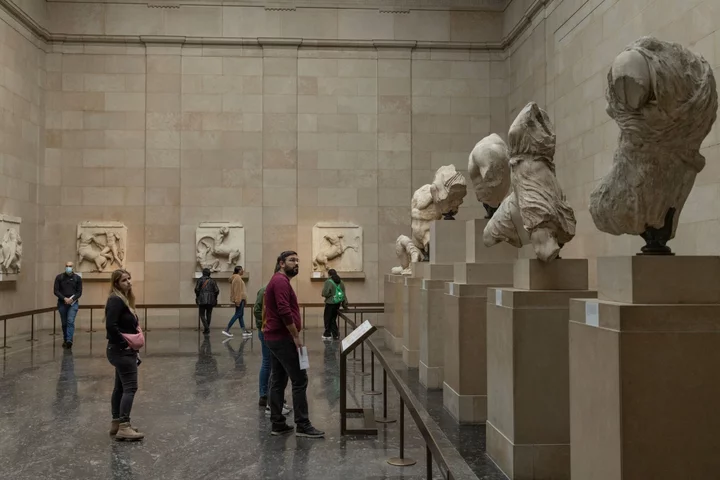UK Prime Minister Rishi Sunak blamed his Greek counterpart for their diplomatic spat and in comments that risk further amplifying tensions, made clear he wants the Parthenon Sculptures at the center of the dispute to remain in the British Museum in London.
The latest episode in a centuries-long feud was sparked when Sunak abruptly canceled a meeting set for Tuesday with Greek premier Kyriakos Mitsotakis. According to Sunak’s spokesman, that was because the Greek government failed to “adhere” to “assurances” it had given that Mitsotakis wouldn’t use his visit to publicly discuss “ancient grievances” about the sculptures.
Read more: Sunak Annoys Greece by Scrapping Meeting Over Elgin Marbles
That interpretation was disputed by the Greek side. A person familiar with the matter said there was no agreement not to raise the issue of the sculptures. Dimitris Tsiodras, head of the Greek premier’s press office, told Mega TV on Tuesday: “We were clear that the issue of sculptures would also be raised.”
The historical artifacts, more commonly known in the UK as the Elgin Marbles, are housed in the British Museum and both countries claim them as their own. In recent years, the sides had been close to resolving the dispute by brokering an arrangement whereby they could be seen in Athens, from where they were taken by British diplomat Lord Elgin in the early 19th century.
The fallout from Sunak’s move appears to make any deal between the British Museum and Greece all but impossible to achieve in the short-term. Sunak’s spokesman, Max Blain, told reporters at a regular briefing the British premier sees any loan arrangement for the marbles as “potentially a slippery slope” that would invite demands from other countries for the return of other artifacts.
“It’s not something we would support,” Blain said. “We do not want to see them leave the British Museum.”
But there are potentially broader implications for Sunak from canceling the meeting, which according to Mitsotakis’s special adviser on international affairs Aristotelia Peloni, was due to see the two leaders update the Greek-UK joint action plan on tackling migration agreed in 2020. Gaza, Ukraine and climate change were also on the agenda.
Reducing what the UK government regards as illegal migrants arriving in small boats from Europe is one of Sunak’s key priorities, and in that context angering a key ally looks like a political own goal.
Despite Downing Street’s efforts to attribute blame to the Greek side, Sunak faced criticism including from within his own Conservative Party. Former Tory leader William Hague, a close ally of Sunak, told Times Radio the cancellation of the meeting was “a pity” and “not a great advert for diplomacy.”
The opposition Labour Party, which leads by about 20 points in national polls, said the premier should have gone ahead with the meeting given key issues like migration and the conflict in the Middle East and Russia’s war in Ukraine.
Blain downplayed suggestions that Mitsotakis’s decision to meet Labour leader Keir Starmer played a role in the row. It was “not unusual” for foreign leaders to meet opposition leaders on visits to the UK, he said.
For his critics, the decision to scrap the meeting will bolster their view of Sunak as petulant and tetchy, an impression that comes across in interviews and in the House of Commons when events aren’t going the prime minister’s way.
The revelation that Downing Street seeks private arrangements with foreign leaders about what can be discussed publicly on visits to Britain will also raise eyebrows, especially as Blain didn’t deny that Sunak made similar agreements with other governments when he travels abroad.
It was Mitsotakis’s BBC interview Sunday that appears to have rankled Sunak.
“If I told you that you would cut the Mona Lisa in half, and you will have half of it at the Louvre and half of it at the British Museum, do you think your viewers would appreciate the beauty of the painting?” Mitsotakis said, referring to the sculptures’ removal from Athens’s acropolis, where others like them still stand.
But Greek officials were adamant that Mitsotakis was not saying anything new.
“I think your prime minister, when he will have a second thought, he will understand that the Greek prime minister is an important person,” Greek development minister Adonis Georgiadis told the BBC on Tuesday. “I have to be very honest - what Kyriakos Mitsotakis mentioned in his interview is not just his own opinion. It is the single one opinion of 11 million Greek people and I think many more million people around the world.”

